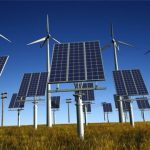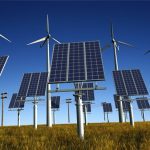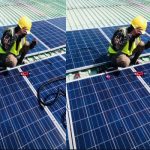The renewable energy and energy efficiency association alliance has identified the use of electric vehicles as one of the ways for Nigeria to achieve renewable energy efficiency.
This was the resolution from its international energy conference on accelerating private sector investment in the renewable energy and energy efficiency sector held in Abuja.
Globally, renewable energy has been adopted as the most proactive option to addressing the challenges of electricity instability.
Every year Nigeria spends $15-20billion to buy petrol for generators and with the recent removal of subsidy from fuel and increase in the pump price, most small businesses are now unable to afford running on fuel.
It is imperative, now more than ever, to utilize the provisions in the electricity act 2023, recently signed by the president.
Against this backdrop the renewable energy and energy efficiency association alliance, convened a one-day solution driven conference to address the issues of epileptic power supply in the country.
At the end of the conference, the use of electric vehicles was identified key achieving renewable energy efficiency.
The development of carbon market opportunities, funding projects with local currency and engaging the 36 states for integrated electricity within their states, were also suggestions reached.
Currently 200 million Nigerians are dependent on 3500 megawatts of electricity from the National grid.
This is hopelessly inadequate which is why there is need to utilize the provisions in the electricity act, which allows for independent state power generation.
The renewable energy and energy efficiency association alliance has identified the use of electric vehicles as one of the ways for Nigeria to achieve renewable energy efficiency.
This was the resolution from its international energy conference on accelerating private sector investment in the renewable energy and energy efficiency sector held in Abuja.
Globally, renewable energy has been adopted as the most proactive option to addressing the challenges of electricity instability.
Every year Nigeria spends $15-20billion to buy petrol for generators and with the recent removal of subsidy from fuel and increase in the pump price, most small businesses are now unable to afford running on fuel.
It is imperative, now more than ever, to utilize the provisions in the electricity act 2023, recently signed by the president.
Against this backdrop the renewable energy and energy efficiency association alliance, convened a one-day solution driven conference to address the issues of epileptic power supply in the country.
At the end of the conference, the use of electric vehicles was identified key achieving renewable energy efficiency.
The development of carbon market opportunities, funding projects with local currency and engaging the 36 states for integrated electricity within their states, were also suggestions reached.
Currently 200 million Nigerians are dependent on 3500 megawatts of electricity from the National grid.
This is hopelessly inadequate which is why there is need to utilize the provisions in the electricity act, which allows for independent state power generation.
The renewable energy and energy efficiency association alliance has identified the use of electric vehicles as one of the ways for Nigeria to achieve renewable energy efficiency.
This was the resolution from its international energy conference on accelerating private sector investment in the renewable energy and energy efficiency sector held in Abuja.
Globally, renewable energy has been adopted as the most proactive option to addressing the challenges of electricity instability.
Every year Nigeria spends $15-20billion to buy petrol for generators and with the recent removal of subsidy from fuel and increase in the pump price, most small businesses are now unable to afford running on fuel.
It is imperative, now more than ever, to utilize the provisions in the electricity act 2023, recently signed by the president.
Against this backdrop the renewable energy and energy efficiency association alliance, convened a one-day solution driven conference to address the issues of epileptic power supply in the country.
At the end of the conference, the use of electric vehicles was identified key achieving renewable energy efficiency.
The development of carbon market opportunities, funding projects with local currency and engaging the 36 states for integrated electricity within their states, were also suggestions reached.
Currently 200 million Nigerians are dependent on 3500 megawatts of electricity from the National grid.
This is hopelessly inadequate which is why there is need to utilize the provisions in the electricity act, which allows for independent state power generation.
The renewable energy and energy efficiency association alliance has identified the use of electric vehicles as one of the ways for Nigeria to achieve renewable energy efficiency.
This was the resolution from its international energy conference on accelerating private sector investment in the renewable energy and energy efficiency sector held in Abuja.
Globally, renewable energy has been adopted as the most proactive option to addressing the challenges of electricity instability.
Every year Nigeria spends $15-20billion to buy petrol for generators and with the recent removal of subsidy from fuel and increase in the pump price, most small businesses are now unable to afford running on fuel.
It is imperative, now more than ever, to utilize the provisions in the electricity act 2023, recently signed by the president.
Against this backdrop the renewable energy and energy efficiency association alliance, convened a one-day solution driven conference to address the issues of epileptic power supply in the country.
At the end of the conference, the use of electric vehicles was identified key achieving renewable energy efficiency.
The development of carbon market opportunities, funding projects with local currency and engaging the 36 states for integrated electricity within their states, were also suggestions reached.
Currently 200 million Nigerians are dependent on 3500 megawatts of electricity from the National grid.
This is hopelessly inadequate which is why there is need to utilize the provisions in the electricity act, which allows for independent state power generation.
The renewable energy and energy efficiency association alliance has identified the use of electric vehicles as one of the ways for Nigeria to achieve renewable energy efficiency.
This was the resolution from its international energy conference on accelerating private sector investment in the renewable energy and energy efficiency sector held in Abuja.
Globally, renewable energy has been adopted as the most proactive option to addressing the challenges of electricity instability.
Every year Nigeria spends $15-20billion to buy petrol for generators and with the recent removal of subsidy from fuel and increase in the pump price, most small businesses are now unable to afford running on fuel.
It is imperative, now more than ever, to utilize the provisions in the electricity act 2023, recently signed by the president.
Against this backdrop the renewable energy and energy efficiency association alliance, convened a one-day solution driven conference to address the issues of epileptic power supply in the country.
At the end of the conference, the use of electric vehicles was identified key achieving renewable energy efficiency.
The development of carbon market opportunities, funding projects with local currency and engaging the 36 states for integrated electricity within their states, were also suggestions reached.
Currently 200 million Nigerians are dependent on 3500 megawatts of electricity from the National grid.
This is hopelessly inadequate which is why there is need to utilize the provisions in the electricity act, which allows for independent state power generation.
The renewable energy and energy efficiency association alliance has identified the use of electric vehicles as one of the ways for Nigeria to achieve renewable energy efficiency.
This was the resolution from its international energy conference on accelerating private sector investment in the renewable energy and energy efficiency sector held in Abuja.
Globally, renewable energy has been adopted as the most proactive option to addressing the challenges of electricity instability.
Every year Nigeria spends $15-20billion to buy petrol for generators and with the recent removal of subsidy from fuel and increase in the pump price, most small businesses are now unable to afford running on fuel.
It is imperative, now more than ever, to utilize the provisions in the electricity act 2023, recently signed by the president.
Against this backdrop the renewable energy and energy efficiency association alliance, convened a one-day solution driven conference to address the issues of epileptic power supply in the country.
At the end of the conference, the use of electric vehicles was identified key achieving renewable energy efficiency.
The development of carbon market opportunities, funding projects with local currency and engaging the 36 states for integrated electricity within their states, were also suggestions reached.
Currently 200 million Nigerians are dependent on 3500 megawatts of electricity from the National grid.
This is hopelessly inadequate which is why there is need to utilize the provisions in the electricity act, which allows for independent state power generation.
The renewable energy and energy efficiency association alliance has identified the use of electric vehicles as one of the ways for Nigeria to achieve renewable energy efficiency.
This was the resolution from its international energy conference on accelerating private sector investment in the renewable energy and energy efficiency sector held in Abuja.
Globally, renewable energy has been adopted as the most proactive option to addressing the challenges of electricity instability.
Every year Nigeria spends $15-20billion to buy petrol for generators and with the recent removal of subsidy from fuel and increase in the pump price, most small businesses are now unable to afford running on fuel.
It is imperative, now more than ever, to utilize the provisions in the electricity act 2023, recently signed by the president.
Against this backdrop the renewable energy and energy efficiency association alliance, convened a one-day solution driven conference to address the issues of epileptic power supply in the country.
At the end of the conference, the use of electric vehicles was identified key achieving renewable energy efficiency.
The development of carbon market opportunities, funding projects with local currency and engaging the 36 states for integrated electricity within their states, were also suggestions reached.
Currently 200 million Nigerians are dependent on 3500 megawatts of electricity from the National grid.
This is hopelessly inadequate which is why there is need to utilize the provisions in the electricity act, which allows for independent state power generation.
The renewable energy and energy efficiency association alliance has identified the use of electric vehicles as one of the ways for Nigeria to achieve renewable energy efficiency.
This was the resolution from its international energy conference on accelerating private sector investment in the renewable energy and energy efficiency sector held in Abuja.
Globally, renewable energy has been adopted as the most proactive option to addressing the challenges of electricity instability.
Every year Nigeria spends $15-20billion to buy petrol for generators and with the recent removal of subsidy from fuel and increase in the pump price, most small businesses are now unable to afford running on fuel.
It is imperative, now more than ever, to utilize the provisions in the electricity act 2023, recently signed by the president.
Against this backdrop the renewable energy and energy efficiency association alliance, convened a one-day solution driven conference to address the issues of epileptic power supply in the country.
At the end of the conference, the use of electric vehicles was identified key achieving renewable energy efficiency.
The development of carbon market opportunities, funding projects with local currency and engaging the 36 states for integrated electricity within their states, were also suggestions reached.
Currently 200 million Nigerians are dependent on 3500 megawatts of electricity from the National grid.
This is hopelessly inadequate which is why there is need to utilize the provisions in the electricity act, which allows for independent state power generation.














